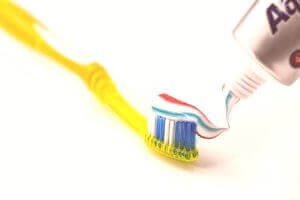
How your dental health affects your overall health: Don’t have time for your scheduled dental appointment? Think again. More and more studies show a direct correlation between your oral health and your overall health. This means unhealthy teeth may lead to other problems such as heart disease and high blood pressure.
What’s the connection?
Scientists think that it may have to do with bacteria. Don’t panic just yet. Many areas of your body such as your mouth, skin, and intestines—are swarming with bacteria. Unless you have a health condition that compromises your immune system, this bacteria is harmless. Bacteria in your mouth are kept under control by regular brushing, flossing and scheduled dental cleanings with a professional hygienist. If you slack off on these important steps, it leads to tooth decay and gum disease. Periodontitis is a serious form of gum disease that might play a role in other diseases throughout your body. The increase in bacteria has a domino effect on systems throughout your body—particularly if you already have chronic conditions such as diabetes and HIV/AIDS, which lower your body’s resistance to infection.
Diseases and conditions related to your dental health
When bacteria overpopulate your mouth, they move to other parts of your body. Poor oral health may contribute to the following diseases:
- Heart disease, including endocarditis, an infection of the inner lining of the heart
- Pregnancy complications, including low birth weight and premature birth
- Diabetes
- Eating disorders
- Alzheimer’s disease
- Osteoporosis
- Lesions, which are common in those with HIV/AIDS
Protect your oral health
There are a lot of common sense measures you can take to safeguard your oral health. Here’s a checklist:
Stop smoking.
Using tobacco products, including snuff and chewing tobacco, can damage your teeth and put you at greater risk for oral cancer.
Brush your teeth at least twice a day.
Be sure to use fluoride toothpaste that has been approved by the American Dental Association.
Change your toothbrush every couple of months.
Be sure to change it after you’ve had a cold or an illness.
Watch what you eat.
Avoid sticky, sugary snacks that adhere to your teeth. See a list of 5 surprising foods that are harmful to your teeth here!
Don’t skip your twice-a-year cleanings.
Did you know that most dental insurance plans will pay for two cleanings a year? Don’t throw away your benefits! Your bi-annual checkups are also a time when your dentist checks your mouth for signs of oral cancer. Brushing your teeth regularly is not only beneficial to your overall health, but it also improves your quality of life. Bacteria overgrowth can lead to painful conditions such as tooth decay. If not treated in a timely manner or with Laser Gum Therapy, dental infections can spread far into the tooth and irritate the jaw bone. At times like this, a root canal may be needed. If you have any questions on how your oral health may be affecting your overall health, or if you have one of the conditions listed above, speak to your dentist for additional information.
